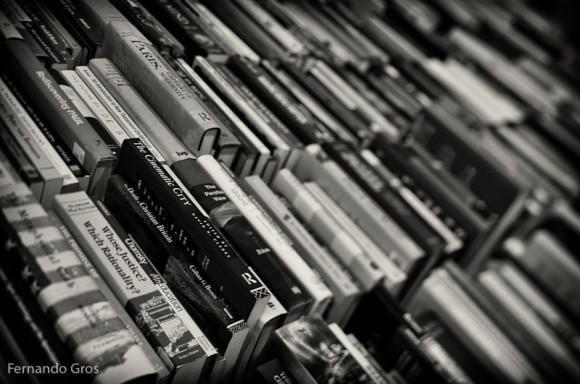Books By The Metre
This picture, of my non-fiction books, was taken while organising and unpacking my personal library. I was lining the books up along the floor in order to figure out how many linear metres of shelf space were needed. I’m having shelves custom built for the small room that will be an electronics free reading space. […]
This picture, of my non-fiction books, was taken while organising and unpacking my personal library. I was lining the books up along the floor in order to figure out how many linear metres of shelf space were needed. I’m having shelves custom built for the small room that will be an electronics free reading space.
Non-fiction (comprised mostly of works in philosophy, theology, history, cultural studies and language) form the largest part of the library. I also have smaller collections in food, travel, fiction, poetry, music, architecture and the visual arts.
During the recent move I ditched, donated and dumped a lot of books (I had a similar clean out back in 2005). Overall, I have a third fewer books now than when I left London in 2003; even though I haven’t stopped buying new titles.
There were patterns to the kinds of books I let go this time round. A lot of theology-related books failed to keep their place. While I kept most of the commentaries, primary texts, “classics” and works on church history, I had no interest in keeping more recent books on contemporary debates, issues and church politics.
A fair few cookbooks also went out the door. Most had words like quick, easy, simple and fast in their titles, bylines or descriptions. Similarly, I culled a lot of introductory books in computing, photography and music.
While I offloaded a few unread books, there still remained a lot of unread material in the library. This is something that confuses some people, especially non-readers; why keep a lot of unread books on the shelves?
The rationale for that is best expressed by novelist Umberto Eco (owner of a 30,000+ books), in a oft-quoted section of Nassim Nicholas Taleb’s book, The Black Swan: Second Edition: The Impact of the Highly Improbable,
“The writer Umberto Eco belongs to that small class of scholars who are encylopedic, insightful, and nondull. He is the owner of a large personal library (containing thirty thousand books), and separates visitors into two categories: those who react with “Wow! Signore professore dottore Eco, what a library you have! How many of these books have you read?” and the others – a very small minority – who get the point that a private library is not an ego-boosting appendage but a research tool. Read books are far less valuable than unread ones. The library should contain as much of what you do not know as your financial means, mortgage rates, and the currently tight read-estate market allows you to put there. You will accumulate more knowledge and more books as you grow older, and the growing number of unread books on the shelves will look at you menacingly. Indeed, the more you know, the larger the rows of unread books. Let us call this collection of unread books an antilibrary.”
Sure, some sad, status-anxious individuals buy books as a way to appear well-read or educated. It’s as pointlessly showy as undriven cars, unplayed guitars, unused flashy kitchens and un-utilised sports-club memberships.
But, for the rest of us, those unread books are investment in growth, learning and humility. We buy books as a way of acknowledging how much we don’t know, how much wisdom there is left to acquire and how far ahead of us the greats, in every field of endeavour we put our minds to, are from our own efforts. As Twyla Tharp put it in The Creative Habit: Learn It and Use It for Life,
“I read for growth, firmly believing that what you are today and what you will be in five years depends on two things: the people you meet and the books you read.”





